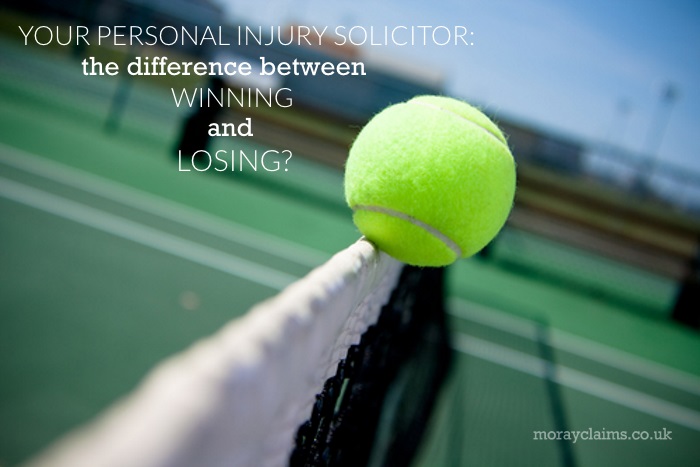Terence Connelly suffered a serious injury to his arm.
He fell while playing tennis on a carpeted court at a leisure centre in Renfrew. One of his feet got stuck in the surface and he fell heavily.
It appears that he had on the wrong kind of tennis shoes. It turned out there was a special type of shoes he should have been wearing, though he did not know that at the time.
Mr Connelly made a personal injury claim against the leisure centre.
He pointed to the fact that, following the accident, signs were put up at the centre stating: “Non-marking smooth-soled tennis shoes on carpet courts”.
His action was unsuccessful in the Sheriff Court before first the Sheriff and then on appeal to the Sheriff Principal. He further appealed to the Court of Session but that appeal also failed.
He conducted all three hearings in the case himself.
In essence, the claim was unsuccessful because the various judges did not feel able to say that, on the available evidence at the date of the accident as presented to the Sheriff at the Proof, the leisure centre should have known of the risk to players of wearing the “wrong” type of tennis shoes on a carpeted surface.
The three judges who heard the appeal in the Court of Session appear to have had some sympathy for Mr Connelly.
They stated that it was “unfortunate” that he had not been legally represented at the court hearings.
One aspect of this was evidence Mr Connelly produced to the Court of Session “too late” for it to form part of the evidence in the case. This evidence related to the state of knowledge in the leisure industry of risks involved in the use of rib-soled footwear on a carpeted playing surface.
Had Mr Connelly been legally represented, the importance of this line of evidence might have been appreciated earlier.
If it had been – and the relevant information given to the Sheriff at the original hearing – it could have had a crucial effect on the overall outcome.
Mr Connelly was also unaware of the procedure he should have adopted if he wanted to try to persuade the Court of Session to allow the evidence in late (though it has to be said it is not certain that the court would have agreed to allow it late anyway).
In most personal injury claim situations, in order to have a successful claim you have to be able to show that there has been fault.
In other words, negligence on the part of another person or organisation which caused you to be injured. “No claim without blame” is a common way to describe this requirement.
Knowledge that something is potentially dangerous (for example, a carpeted tennis court for the wrong type of footwear) can be an important ingredient of negligence.
Handling personal injury claims is not an exact science.
It can often be a difficult judgement for us whether, in a particular case, we have enough evidence to prove the blame that is necessary for the claim to succeed.
With the benefit of hindsight, there are always going to be some claims we gave up on which we probably could have won and claims we ran which we should have realised were not going to be successful.
We can’t do much about the failed claims but, if we ever take the view that a claim will have to be dropped due to lack of prospects, we will usually recommend you to speak to another solicitor and get a second opinion. We don’t assume that we get it right every time, though we try our best.
It seems that Mr Connelly was originally represented by solicitors.
It is not clear from the reports of the case why he ended up conducting the hearings himself.
He made a good job of presenting his case in the circumstances but it was, unfortunately, not good enough to win. Had he teamed up with a legal representative who understood what was the crucial evidence – and how and when it would require to be presented – the outcome might well have been different.
Your personal injury claim solicitor may be the difference between you winning and losing your claim.
You can read the transcript of the Court of Session decision here.
How we can help
If you have any questions about any matter raised in this article, feel free to contact us. All enquiries are at no charge and without obligation.
You can contact us on 01343 544077 or send us a Free Online Enquiry.
